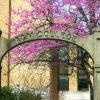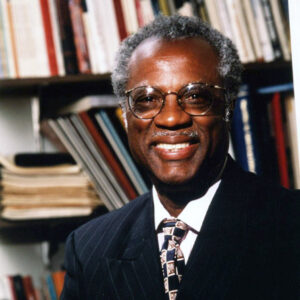calsfoundation@cals.org
James Albert Banks (1941–)
James Albert Banks is an educator who has been called the “father of multicultural education,” a discipline that seeks to develop awareness and skills in teachers and students for living in a culturally diverse United States and world. Growing up as an African-American youth in the Arkansas Delta during the Jim Crow years, Banks developed a commitment to social justice. Banks became the first black professor in the College of Education at the University of Washington (UW) in Seattle and was also founding director of UW’s Center for Multicultural Education, which was renamed the Banks Center for Educational Justice when Banks retired from UW in 2019.
James Banks was born on September 24, 1941, near Marianna (Lee County) to Matthew Banks and Lula Holt Banks, both farmers. His formal education began at the McCullough Union School, which he walked five miles to attend. During his second year of schooling, rural schools consolidated, and he was bused to the Newsome Training School in Aubrey (Lee County), where he attended elementary and junior high school between 1948 and 1957. He graduated in 1960 from the Robert Russa Moton High School in Marianna, located about ten miles from his home.
Banks obtained his associate of arts degree with high scholastic honors from Chicago City Junior College in 1963. The following year, he received his bachelor’s degree in elementary education and social science with honors from Chicago Teachers College (now Chicago State University), and between 1966 and 1969, he received his master’s and PhD degrees in these fields from Michigan State University. Banks taught at Forrest Park School in Joliet, Illinois, and at the Francis W. Parker School in Chicago between 1965 and 1966.
Banks married Cherry A. McGee, a college professor and author, on February 15, 1969; the two have written several books and articles together. They had two daughters, Angela Banks and Patricia Banks, who both became college professors.
Banks joined the faculty of the UW College of Education in 1969. He served as assistant professor and associate professor until 1971 and 1973, respectively, becoming a full professor in 1973. In 1992, Banks founded the Center for Multicultural Education at the university and became its director. Banks was named Russell F. Stark University Professor in 2000 and then Kerry and Linda Killinger Professor of Diversity Studies in 2006.
During his childhood, Banks felt that the images of happy slaves in his social studies textbooks were a contradiction to the stark reality of racial segregation that he and his community experienced, and he began asking who created the images of happy slaves, and who develops curriculum. These became crucial social justice research questions. In time, they have taken newer forms. Through his teaching, research, and writings, Banks has continually tried to explain issues in black studies, ethnic studies, multiethnic studies, multicultural education, and citizenship education.
The demographics of the United States and its schools have been rapidly changing. This being the case, in more than four decades of research, Banks has created a fund of knowledge—dimensions, approaches, paradigms, principles of curriculum, teaching, and assessment—for curriculum developers and educators, all aimed at helping students from diverse ethnic, language, and other cultural groups to develop knowledge, attitudes, and skills to become effective citizens in a multicultural nation and a diverse world. Stated simply, Banks has provided teachers with detailed answers as to what to teach, how to teach, and how to assess students from different ethnic groups such as Native American, African American, European American, Hispanic American, Asian American, and Arab American, and other cultural categories such as gender. Banks has emphasized that textbooks must not merely describe concepts from the perspective of the dominant culture. Rather, they must also include viewpoints of different cultural groups. For example, in explaining westward expansion, it is imperative that textbooks include the perspectives of Native Americans. Teachers have a responsibility to reduce prejudice and empower “all” students with the goal of creating a just society.
Banks has authored or edited more than twenty books, as well as over sixty book chapters and written about 100 journal articles. Banks is editor of two landmark publications: Handbook of Research on Multicultural Education (1995, second edition 2004) and Encyclopedia of Diversity in Education (2012). He also edits a multicultural education book series published by Teachers College Press at Columbia University.
In 1971, Banks was appointed a member of the Task Force to Reevaluate Social Science Textbooks in California. He visited Hawaii, Mexico, Puerto Rico, France, and Great Britain to examine multiethnic education during the 1976–77 school year. In 2000, he was elected a member of the National Academy of Education. Banks was president of the National Council for the Social Studies (1982) and the American Educational Research Association (1997–1998). He has received honorary doctorates from six colleges and universities, as well as the UCLA Medal.
Banks was the twenty-ninth annual faculty lecturer at the University of Washington in 2004–05, the university’s highest honor for a faculty member. In 2004, the American Educational Research Association (AERA) awarded its first Social Justice in Education Award to Banks for a career of research that advances social justice through education research. In the fall of 2007, he was the Tisch Distinguished Visiting Professor at Teachers College, Columbia University, in New York. In January 2019, he retired from the University of Washington.
For additional information:
Banks, James A. Diversity, Transformative Knowledge, and Civic Education: Selected Essays. New York and London: Routledge, 2020.
Brown, Quinn Russell. “Thanks, Professor Banks: ‘The Father of Multicultural Education’ Is Retiring after 50 Years at UW.” Columns: The University of Washington Alumni Magazine. Online at https://magazine.washington.edu/feature/james-banks-uw-retires-multicultural-education/ (accessed September 7, 2023).
“Professor James A. Banks.” University of Washington, Seattle. https://education.uw.edu/people/faculty/jbanks (accessed September 7, 2023).
Anita Rao Mysore
University of Arkansas Libraries
 Divergent Prosperity and the Arc of Reform, 1968–2022
Divergent Prosperity and the Arc of Reform, 1968–2022 Education, Higher
Education, Higher James Banks
James Banks 




Comments
No comments on this entry yet.